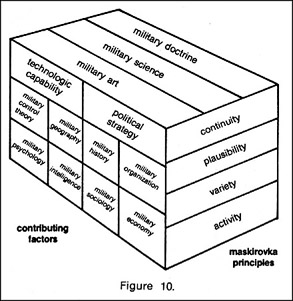Maskirovka: Difference between revisions
imported>Howard C. Berkowitz (New page: '''''Maskirovka''''' is a term of art in Soviet and Russian military thought, which includes Western military concepts of deception, but goes well beyond. Their usage include decep...) |
imported>Howard C. Berkowitz No edit summary |
||
| Line 1: | Line 1: | ||
[[Image:INTEL-COGNITIVE-maskirovka-doctrine.jpg | thumb|450px | ''maskirovka'' operates at many levels]] | |||
'''''Maskirovka''''' is a [[term of art]] in Soviet and Russian military thought, which includes Western military concepts of [[deception]], but goes well beyond. Their usage include deception, [[operational security]] and [[concealment]], as an integral part of all planning, in which the highest levels of command are involved. <ref>{{cite journal | '''''Maskirovka''''' is a [[term of art]] in Soviet and Russian military thought, which includes Western military concepts of [[deception]], but goes well beyond. Their usage include deception, [[operational security]] and [[concealment]], as an integral part of all planning, in which the highest levels of command are involved. <ref>{{cite journal | ||
| journal = Airpower Journal | | journal = Airpower Journal | ||
| Line 5: | Line 8: | ||
| author = Smith, Charles L. | | author = Smith, Charles L. | ||
}}</ref> | }}</ref> | ||
Bacon wrote "The [[Battle of Kursk]] was also an example of effective Soviet maskirovka. While the Germans were preparing for their Kursk offensive, the Soviets created a story that they intended to conduct only defensive operations at Kursk. The reality was the Soviets planned a large counteroffensive at Kursk once they blunted the German attack. .... German intelligence for the Russian Front assumed the Soviets would conduct only “local” attacks around Kursk to “gain a better jumping off place for the winter offensive.” The counterattack by the Steppe Front stunned the Germans | |||
<ref>{{cite web | |||
| author = Bacon, Donald J. | |||
| title = Second World War Deception: Lessons Learned for Today’s Joint Planner, Wright Flyer Paper No. 5 | |||
| publisher = (US) Air Command and Staff College | |||
| date = December 1998 | |||
| url = http://www.au.af.mil/au/awc/awcgate/wright/wf05.pdf | |||
| accessdate = 2007-10-24}} </ref>. | |||
The opponent may try to overload the analytical capability | |||
<ref>{{cite book | |||
| author = Luttwak, Edward | |||
| title = Coup D'Etat: A Practical Handbook | |||
| publisher = Harvard University Press | |||
| year = 1997 | |||
}} </ref>, | |||
As a warning to those preparing the intelligence budget, and to those agencies where the fast track to promotion is in collection, one's own side may produce so much raw data that the analyst is overwhelmed, even without enemy assistance. | |||
==References== | ==References== | ||
{{reflist|2}} | {{reflist|2}} | ||
Revision as of 16:26, 8 July 2009
Maskirovka is a term of art in Soviet and Russian military thought, which includes Western military concepts of deception, but goes well beyond. Their usage include deception, operational security and concealment, as an integral part of all planning, in which the highest levels of command are involved. [1]
Bacon wrote "The Battle of Kursk was also an example of effective Soviet maskirovka. While the Germans were preparing for their Kursk offensive, the Soviets created a story that they intended to conduct only defensive operations at Kursk. The reality was the Soviets planned a large counteroffensive at Kursk once they blunted the German attack. .... German intelligence for the Russian Front assumed the Soviets would conduct only “local” attacks around Kursk to “gain a better jumping off place for the winter offensive.” The counterattack by the Steppe Front stunned the Germans [2].
The opponent may try to overload the analytical capability [3], As a warning to those preparing the intelligence budget, and to those agencies where the fast track to promotion is in collection, one's own side may produce so much raw data that the analyst is overwhelmed, even without enemy assistance.
References
- ↑ Smith, Charles L. (Spring 1988). "Soviet Maskirovko". Airpower Journal.
- ↑ Bacon, Donald J. (December 1998). Second World War Deception: Lessons Learned for Today’s Joint Planner, Wright Flyer Paper No. 5. (US) Air Command and Staff College. Retrieved on 2007-10-24.
- ↑ Luttwak, Edward (1997). Coup D'Etat: A Practical Handbook. Harvard University Press.
